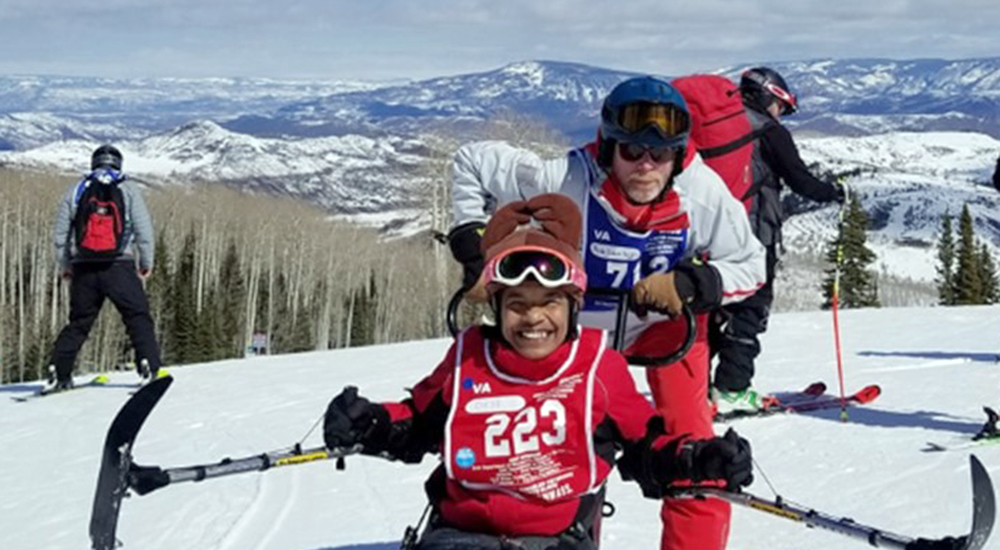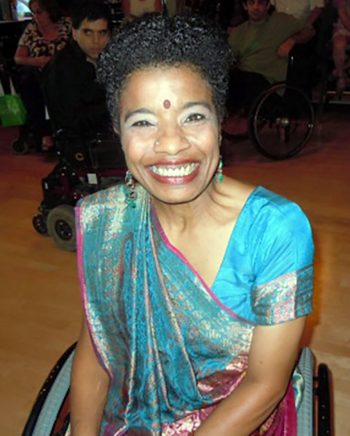Army Veteran Desiree Emilio-Duverge sat in the VA Palo Alto campus canteen with a fellow Veteran who was telling her about his son and how he hoped to visit him soon. It was a very personal conversation. When the gentleman got up to leave, I asked him how long they’d known each other.
“We just met before you got here!” Desi, as she’s known to most, exclaimed.
Desi tends to make connections everywhere she goes. Priscilla Azcueta is Desi’s Compensated Work Therapy (CWT) case manager and joked, “If we leave her alone in the cafeteria for 10 minutes, she will have met everybody in there!”
Although she’s known for this friendly exuberance, the CWT alum has had a long journey.
Desi is in a wheelchair full-time and lives with chronic pain, the result of a severe respiratory illness she developed during her time in service in Germany.
“The wheelchair is the easy part,” she said. “The chronic pain is what never stops and it’s high grade.”
“I needed to distance myself from the pain.”
At the time of her initial spinal injury, Desi was told she needed a surgery she may not survive or, at best, would leave her breathing out of a trach tube the rest of her life.
Although she survived and now breathes without the use of a tube, she also suffered a quadriplegic C-spine injury during the procedure that would leave her in a wheelchair for the rest of her life.
“I was resolved that I’m not going to let this kill me,” she said. “I needed to distance myself from the pain.”
Getting involved with Challenge Aspen, a non-profit organization that offers adaptive outdoor activities for individuals with physical or cognitive disabilities, she learned to ski using adaptive equipment and found a new passion.
“It changed me to my core,” she said. “I needed adrenaline, not pity.”
Along with adaptive sports, she also embraced possibilities for a new career which is what led her to CWT.
With Azcueta as her case manager, the two explored the idea of Desi going into business for herself, marketing her crochet work.
Donates items for charities that support Veterans
“Her strongest passion was her crochet,” Azcueta said, explaining that for the past few years, Desi has been making crocheted sweaters, hats, vests and more. She donates many of them as auction items for charities that support children and disabled Veterans.
Her designs have brought in thousands of dollars for these charities over the past few years and she enjoys making unique items that cater to the adaptive community.
“You can’t walk into Kohl’s and find a sweater or a blouse with one arm,” she said. “When I saw that selling these items brought in money, I realized it can be a way to give back to disabled Veterans and children. I became impassioned. Veterans are supposed to be taking care of Veterans.”
She explained that adaptive sports and her work with CWT helped her gain confidence. She encourages others who have been through trauma to embrace challenges as opportunities.
“Look for what you don’t know how to do,” she added. “If you only look for the familiar, there’s no challenge. Make an adventure of it. There’s a place for you and your part is absolutely necessary.”
Kameela Din is the technical writer for the CWT Program at VA Palo Alto.
Topics in this story
More Stories
VA’s latest data shows a decrease in the suicide rate among women Veterans, but more effective interventions and support systems are needed.
Making healthy choices about what you eat and drink is a powerful way to care for yourself. You need the right fuel to feel well and have the energy to do what matters most to you.
Blind TeleRehabilitation offers blind and visual impairment rehabilitation assessment, training, specialized technology and support groups.






